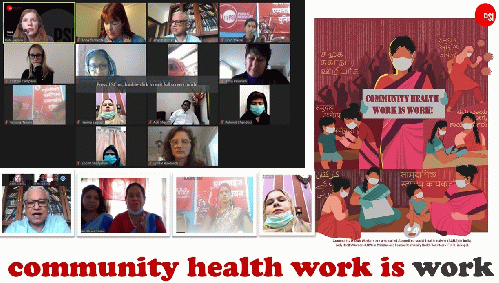
community health work is work, not 'voluntary'. Precarious work is a threat for public health
(Image by CNS) Details DMCA
Community health workers across the south Asia region have united in solidarity and launched a campaign to assert their rights as workers. Kate Lappin, Regional Secretary for Asia and Pacific, Public Services International (PSI) said that community health workers across the South Asia region play a critical role in providing primary healthcare, raising awareness, and facilitating access to public healthcare to hundreds of millions of rural people. In South Asia, community health workers are almost entirely women who are expected to do this vital work without being recognised as public health workers and without the payment of adequate wages.
precarious work is a threat to public health
Kate added that community health workers currently face the risk of contracting COVID-19 through their work but are perversely denied health and life insurance as well as pensions. Governments have recognised community health workers as 'warriors against COVID-19' yet have routinely failed to provide adequate personal protective equipment (PPE) kits, training, wages or support. Their repeated requests for provision of safety kits, masks and sanitisers during the COVID-19 door-to-door visits and surveys has been denied by the authorities. With increased risks of exposure to the virus, the pandemic has illustrated that precarious work is a threat to public health.
World Health Organization (WHO) has long recognized the role of community health workers underlining that they "play a crucial role in broadening access and coverage of health services in remote areas and can undertake actions that lead to improved health outcomes."
Rosa Pavanelli, General Secretary, PSI stressed that it is important to formalize the relationship of community health workers with public authorities to enhance their quality of working conditions. This pandemic has shown that how tragic is the scarcity of health professionals globally. No country has been able to keep on treating patients at the level necessary. International organizations including the WHO are relying on greater task sharing by community health workers to strengthen primary healthcare. It is the women who shoulder lion's share of this essential work. It is necessary to establish policies for ensuring labour and professional standards as well as adequate training and support. It is also vital for governments to regulate the working conditions of all healthcare workers. Rosa added that COVID-19 pandemic has brought home the reality of primary health care as an essential filter to reduce the pressure on hospitals or emergency care.
Unions representing community health workers have documented a range of threats and violations experienced during the pandemic. Community health workers are facing heightened risks of infection and enduring long working hours, psychological distress, fatigue, occupational burnout, discrimination and physical and psychological harassment. Many community health workers have reported not being paid during the pandemic.
In India, there are three groups of community health workers: Accredited Social Health Activists (ASHA) who are all women, Auxiliary Nurse Midwife (ANM), and Anganwadi. Yamuna Tekam, an ASHA worker since four years, represents Nagpur Municipal Corporation Employees Union (NMCEU). Yamuna said that during the pandemic, family wanted her to be home but authorities pressured her to go to the field with a mask. She was not given PPE and seldom got a glove. Abuses were hurled upon her or survey form was torn or water thrown on her colleagues. Three ASHA workers tested positive for COVID-19 in her centre. She was given Rs 30 per day (Rs 1000 for a month) which was far less than what was due.
(Note: You can view every article as one long page if you sign up as an Advocate Member, or higher).





